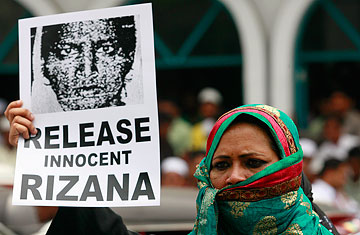
A demonstrator holds an image of Rizana Fathima Nafeek during a protest in front of the Saudi Arabian embassy in Colombo, Sri Lanka, on July 8, 2011
"I will get her back," Razeena Nafeek says softly, her eyes staring straight ahead from beneath the faded red scarf that covers her forehead. Her silence after uttering the words conveys her determination, as well as the seeming enormity of the task. Razeena's 23-year-old daughter, Rizana Fathima Nafeek, has spent the past four years of her life on death row in Saudi Arabia, thousands of miles from her home of Sri Lanka.
This week Rizana's parents will travel to the Saudi Arabia, accompanied by Sri Lankan government officials, to visit the daughter for the first time since 2007. But more importantly, "to try and meet the family [of the victim], to seek a pardon," the mother tells TIME. The victim's family has so far refused to pardon her. The Sri Lankan government officials called the situation "a delicate affair."
Rizana Nafeek's story is typical of thousands of young women from Sri Lanka and other poor Asian countries who leave their homes in search of employment and better lives for their families in Saudi Arabia and the glittering Gulf states. Nafeek flew to the desert kingdom at 17 on a forged passport that said she was 6 years older than she was, without any training or knowledge of Arabic, to work as a maid for a wealthy Saudi family.
But Nafeek's dream went horribly wrong within days of arriving at Dawadamissa, a town about 250 miles from Riyadh, in 2005. Her employers accused her of murdering their 4-month-old infant after the baby accidentally choked while being bottle-fed by her. In June 2007, Nafeek was found guilty and sentenced to death by beheading — a conviction that rights groups say was based on a confession made under duress and the forged passport that changed her status to that of an adult. Last year, the sentence was upheld by Saudi Arabia's highest court.
In the past four years, Nafeek has come dangerously close to being executed even as Sri Lankan President Mahinda Rajapaksa and rights groups like Amnesty International and the Asian Human Rights Commission (AHRC) have campaigned vigorously on her behalf. Then, earlier this year, it appeared as if Nafeek's family might be on the verge of a breakthrough. A high-profile delegation of Sri Lankan officials traveled to Saudi Arabia in August to negotiate with the victim's family for a pardon, and one Sri Lankan newspaper even reported that a pardon had been granted and the officials were just finalizing the formalities. The Sri Lankan Foreign Employment and Welfare Minister, Dilan Perera, told the Arab News, an English-language Saudi daily, that his government was prepared to offer the family a settlement for Nafeek's release. But Basil Fernando, an AHRC director, tells TIME that no progress has been made in the case since then. "There has been no promise of pardon by any authority in Saudi Arabia," he says.
All hope for a pardon now rests with the deceased baby's father, Naif Jiziyan Khalaf al-Otaibi. Under Islamic law, the family has the right to decide whether Nafeek should be granted a pardon, which is not unheard of in murder cases. In July, an Indonesian maid on death row in Saudi Arabia was granted a pardon by the family of her former employer, whom she was convicted of murdering in 2009. (The woman claimed she acted in self-defense during an attempted rape, and the Indonesian government paid a reported $534,000 for her release.) "This gracious act symbolizes the generous nature of the Saudi people," Ahmed Jawad, the Sri Lankan ambassador to Saudi Arabia, said after the Indonesian maid's pardon. "I am optimistic that Rizana Nafeek too would similarly be given her freedom by the parents of the infant."
However, executions are still all too common in the country, as well. Just a month earlier, in June, another Indonesian maid, Ruyati binti Sapubi, was beheaded for killing her female employer. Indonesian authorities, who said Ruyati suffered constant verbal abuse and was forbidden from leaving the country, were so outraged that they recalled their ambassador and stopped sending maids to Saudi Arabia. The ban will remain in effect until the Saudi government signs a memorandum of understanding to protect the rights of Indonesian workers.
Nafeek's family has had no direct contact with the Otaibis in Saudi Arabia, but informal links have been established with the help of an envoy based in the Sri Lankan capital, Colombo. Sri Lankan government officials tell TIME that no one knows if there's been a change of heart by the victim's family. "It is a very delicate affair, and we have to be very careful," says Kingsley Ranawaka, chairman of the Foreign Employment Bureau. Nafeek's mother is also in the dark: "I have no idea how they feel," she says.
Razeena has not seen her daughter since her trial in 2007, though they are able to communicate regularly by phone, which wasn't possible for the first two years after her arrest. The Nafeek family house in the remote town of Muttur, about 200 miles from Colombo, is only half-finished because the family has steadfastly refused offers of financial help to complete the construction. The family of six struggles to get by on the meager earnings of Razeena's husband, Mohammed, who is a woodcutter. "We don't want to live off sympathy, let our daughter come back home first," says Razeena, standing in front of her home, parts of which are covered with tin sheets and dried coconut leaves.
"She is my daughter, and I will get her back," she says again. But she is also prepared for the possibility that it may not happen. "We all die someday," she says in a voice barely louder than a whisper. "I have woken up to that reality everyday."
